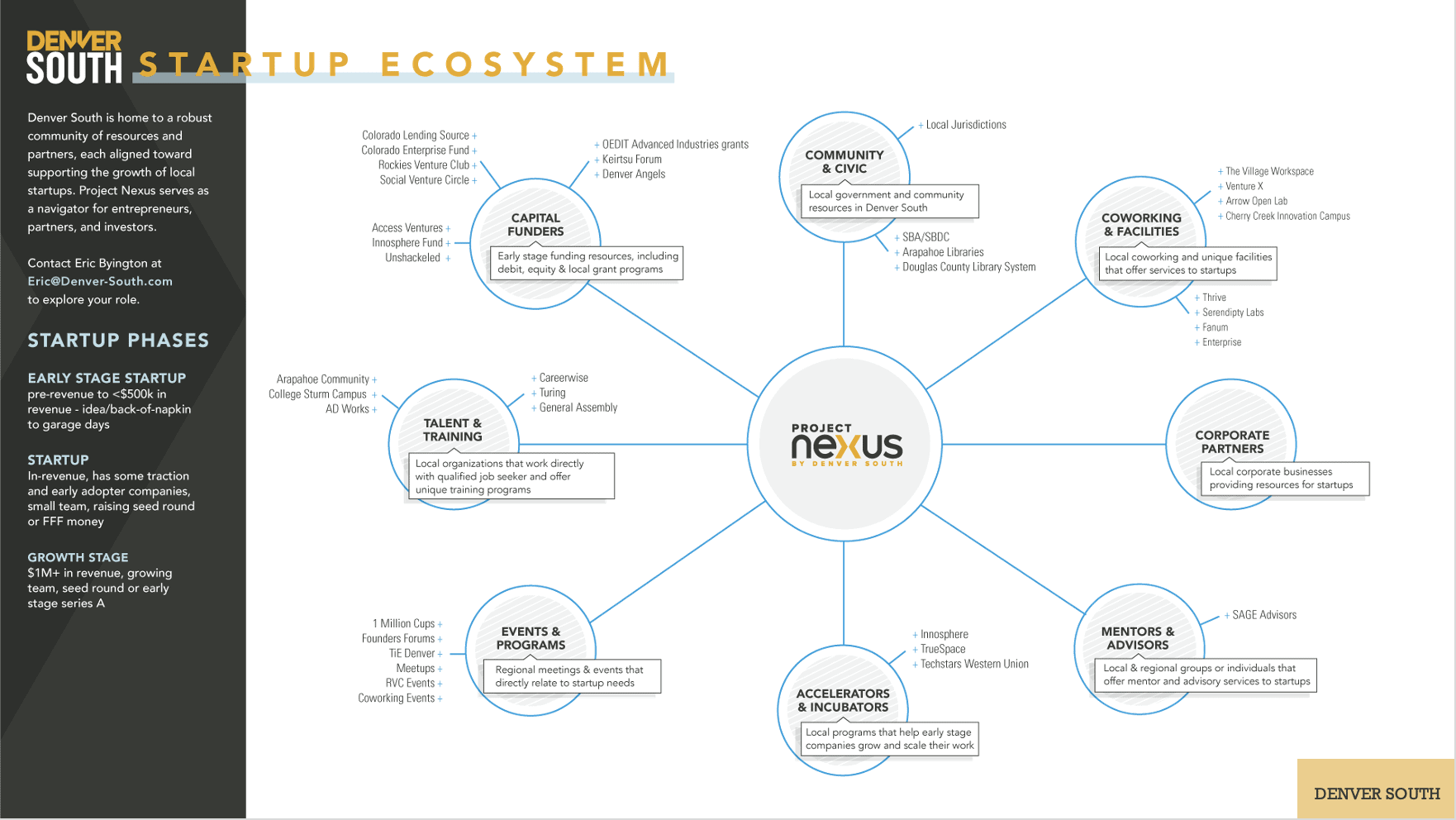According to the Downtown Denver Partnership, 163 startups were founded in the Denver city-center in the past year, employing 5,140 people, and these startups currently account for more than 8% of businesses and total 772 companies. Moreover, these companies have raised $598M in venture capital in the past year.
The successful rate of new small businesses is no coincidence—it’s fostered by a variety of public, private, and non-profit interests and initiatives, not to mention a wealth of highly skilled workers. And something else—what the Downtown Denver Partnership calls the “Give First Ethos.” This refers to creating platforms that encourage collaboration without a hefty entrance fee, leveling the playing field and contributing to a positive and productive culture of progress.
But that’s downtown. The city of Denver has been successful in encouraging startups and small businesses for more than that one reason though. Here’s what the area is doing, and how Denver South can do the same.
Create cost-free platforms that encourage collaboration.
The Downtown Denver Partnership has co-founded and leads several initiatives that “foster a culture of innovation and entrepreneurship,” including Denver Startup Week and the Commons on Champa. Denver Startup Week, which started in 2012, is now the largest free entrepreneurial event of its kind in North America.
In 2017, the program offered 376 free sessions to 18,900 people registered from 48 states. The Commons on Champa was started in 2015. It provides resources including mentorship, business education, and meeting spaces for Denver’s entrepreneurs at low- or no-cost.
These platforms have grown to become part of the fabric of the culture of entrepreneurship in downtown Denver.
Connect entrepreneurs with educational resources on available capital.
Capital can come in many forms, from loans and traditional investors to crowdfunding. The State of Colorado and local Denver metro non-profits help to educate small businesses on their best options and connect them with appropriate funding for their needs. For example, MergeLane, Rockies Venture Club, and Women’s Investor Network all help to prepare startups to make their pitch to investors for venture capital.
Colorado SBA District Office, Denver Metro SBDC Office, and MiCasa Business Counseling Center help connect small businesses with small business loans. Colorado Lending Source, Rocky Mountain MicroFinance Institute, CHFA, Colorado Enterprise Fund, Accion, and Denver Office of Economic Development all help to educate small business owners on microloans, or loans for less than $100,000.
A fairly recent phenomenon, crowdfunding may also be appropriate for certain startups. In 2015, the Colorado Crowdfunding Act approved regulations that allow businesses to raise capital from non-accredited investors up to $5,000 each. Think websites like Kickstarter or Indie GoGo.
Encourage creative coworking spaces and incubators.
Coworking spaces can simply be a shared office space with a view, or they can me more…they can be places where entrepreneurs make helpful professional connections and learn the skills to scale up their small businesses.
Denver South is home to a number of business incubators and coworking spaces that specifically promote cross-pollination with other like-minded professionals as a perk. These include incubators like Innosphere, Prime Health, TiE Denver and more. (Learn more about the Denver South accelerator ecosystem here.)
Make small business good business.
Suggested Reading:
According to a 2018 report by Paychex, Denver was ranked as the top metro area for small business. This is credit to an environment that helps small businesses to succeed. Similar to the Denver South Economic Development Partnership, the Denver Metro Small Business Development Council provides resources to small businesses.
The State also offers a host of user-friendly resources including the Small Business Resource Guide, Small Business Navigator, and the Colorado Small Business Development Center (COSBDC) Network. When small businesses have a network of resources, they are more likely to grow.
To take a lesson from the Denver metro area, it’s not just about having resources available, it’s also about connecting them to create an ecosystem that fosters innovation and entrepreneurship.


